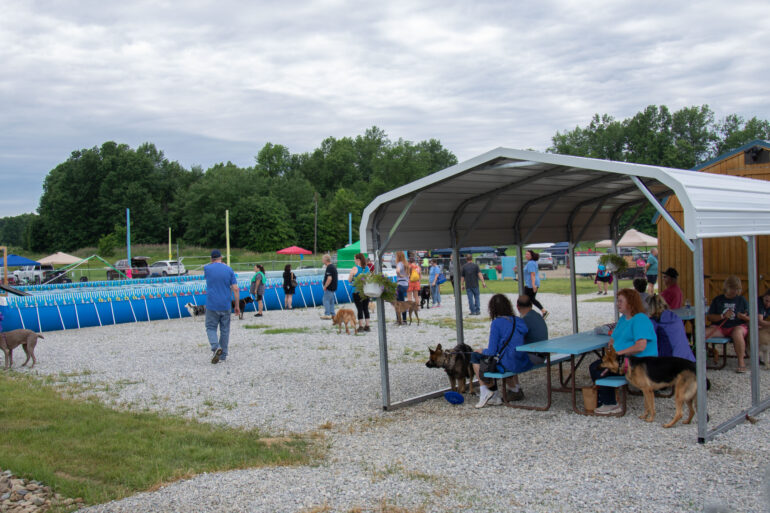The Freedom Township Trustees voted unanimously to remove Ben Fashing from the township’s Board of Zoning Appeals (BZA) following a hearing on Thursday night.
In a second hearing immediately afterward, the trustees discussed the removal of fellow BZA member David Bultinck, but decided to pause the proceeding for further discussion. A second hearing for Bultinck will be held on July 7.
Fashing, who is the board chair, will be formally removed from his position when the trustees approve the minutes of his hearing at their next regular meeting.
The removals stem from a controversy surrounding the planned expansion of a dog training facility in the township, Duke’s K9 Dash N’ Splash, which has become a flashpoint for residents. Some consider Duke’s to be a community asset and say new businesses should be encouraged. Others say the heavy activity at the property is disturbing the area’s rural quality of life.
In a letter written by Portage County assistant prosecutor Brett Bencze and signed by trustees Jeffrey Derthick, Tom Mesaros and Charlene Walker, they accused Fashing and Bultinck of violating residents’ due process in a BZA hearing.
According to the letter, the two conducted online research into Duke’s K9 Dash N’ Splash prior to a May 3 BZA hearing on a case involving Duke’s owner Micheller Filler and her neighbor Dorothy Maur.
Maur, who has in the past complained about the impact of Duke’s on her adjoining property, was challenging the decision of zoning inspector Lou Mincek to grant Filler an agricultural use permit for a building she planned to construct.
The contention is that members of the BZA are not allowed to use any form of outside research other than the Ohio Revised Code and Freedom Township Zoning Resolution, as it may bias their review of the case.
“As a member of the BZA, you are to be an unbiased judiciary,” Walker said in Fashing’s hearing. “And as the chair, you are responsible for the conduct of that meeting. This is not the first time that you have been warned about violating due process. You were warned on Nov. 13, 2016, for similar misconduct. Those are charges.”
The trustees also said Fashing and Bultinck had discussed the case between themselves prior to the public hearing, which, if true, may constitute a violation of Ohio’s Sunshine Laws.
Fashing defended himself in the first hearing, admitting to using two definitions from the Oxford online dictionary (“agriculture” and “animal husbandry”) and going on the website of Duke’s to find its mission statement. But he contended he did so only to inform himself of the case and had not violated due process.
“Without definitions, how do I become informed on a topic I am not familiar with,” Fashing said.
The specific research Bultinck was accused of was much less clear, but he confirmed he had used online resources and also argued it was necessary to inform himself on the topic of the hearing.
“I went to the library and I looked [animal husbandry] up. I didn’t know what it was so I looked it up,” Bultinck said.
Bencze and the trustees argued the only definitions he could use were from the ORC and Freedom Township zoning code.
“That is the way the county has operated for as long as I am aware,” Bencze said.
Fashing and Bultinck agreed on their defense against the charge of violating public records law, saying they had not spoken about the topic of the hearing prior, but instead that Fashing had handed Bultinck case information and was only asking him to read it.
“There was a piece of paper that Ben Fashing handed to me to read,” Bultinck said. “I did not tell him I had a statement to make. He said, ‘David Bultinck I think has something to read,’ and that was the piece of paper that he handed to me.”
As the chair, Fashing said it was his job to try and get all the members of the board involved, and that was why he gave Bultinck something to present. He guaranteed the trustees that he had never been part of any Sunshine Law violations in his eight years on the board.
Though he did speak up a few times throughout the hearing, Bultinck was primarily represented by an attorney, Alfred (Al) Schrader of Akron.
Schrader argued that Bultinck had not done anything improper by researching a topic prior to a hearing to inform himself, and that even if he had there was no evidence his client had ever been informed this was not allowed.
“What [Bultinck] did isn’t a violation of anything, so he shouldn’t suffer the biggest punishment for it,” Schrader said. “And there is no evidence that he was actually taught anything different. If he’d have been listening to me, he definitely would’ve done what he did, because I don’t see anything wrong with it. [I] see he’s done a really good job for the community on the board of appeals. And that board actually is a credit to the community because they did present themselves as being prepared.”
Trustee Walker, who served on the BZA in the past, said it had always been clear to her that any outside research before a hearing was a violation of due process.
“You operated in violation of due process of our residents, conducting research outside of the scope of the hearings of BZA,” she said during Fashing’s hearing.
Fashing will have 30 days to appeal his removal, and the second hearing for Bultinck will take place July 7, after Bencze confirms the county’s definitions of outside research and due process at Derthick’s request.
Owen MacMillan is a reporter with the Collaborative News Lab @ Kent State University, producing local news coverage in partnership with The Portager.

